|
|
|
Sort Order |
|
|
|
Items / Page
|
|
|
|
|
|
|
| Srl | Item |
| 1 |
ID:
157251
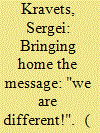

|
|
|
|
|
| Summary/Abstract |
This is happening already. The way I see it, we are living through a fundamentally different stage of international relations, and its meaning is still beyond our grasp. We habitually think that the religious factor enjoys an insignificant role in real politics. In Europe, since the middle of the 17th century, after the Westphalian Peace Treaty when religious wars came to an end, and in Russia since a more recent moment, starting from the 18th century, religious matters gradually stopped to determine foreign policy guidelines. Addressing religious issues could be propagandistically or ideologically motivated or they could be a means of propaganda and ideology or a tool to mobilize society, but they were never decisive. When Joseph Stalin asked how many divisions the Vatican had at its disposal he reflected a common trend.
|
|
|
|
|
|
|
|
|
|
|
|
|
|
|
|
| 2 |
ID:
157240
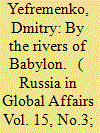

|
|
|
|
|
| Summary/Abstract |
More than a century has passed since Britain, France, and Russia arbitrarily divided the vast territories of the Ottoman Empire into areas of their own post-war dominance. The Sykes-Picot Agreement started the process of partitioning the Middle East into countries that cut through regions historically populated by Arabs and Turks, Kurds and Assyrians, Sunnis and Shiites, Christians and Jews, etc. Subsequently, the borders of those countries changed many times, but the great powers remained consistently involved in the process. And yet, although the borders were largely artificial and the risk of conflict was quite high, the Middle Eastern order held for almost a century (assuming the 1920 Treaty of Sevres is the starting point), and some countries in the region developed quite successfully. But the quality of governance and functionality of the State were never high, and the ability to resist centrifugal tendencies was often ensured by harsh—and sometimes downright repressive—regimes. But the U.S. intervention in Iraq to remove Saddam Hussein and the subsequent Arab Spring created such turbulence that the Middle Eastern order started to crumble, putting Iraq, Syria, Libya, and Yemen on the brink of disintegration.
|
|
|
|
|
|
|
|
|
|
|
|
|
|
|
|
| 3 |
ID:
157247
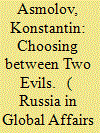

|
|
|
|
|
| Summary/Abstract |
On September 3, 2017, North Korea conducted its sixth nuclear test, that of a hydrogen bomb, which can be mounted on an intercontinental ballistic missile. Pyongyang's statements that it has completed the development of nuclear weapons have put an end to a period of uncertainty, when the great powers thought that the North Korean nuclear issue could simply be wished away.
|
|
|
|
|
|
|
|
|
|
|
|
|
|
|
|
| 4 |
ID:
157246


|
|
|
|
|
| Summary/Abstract |
Over the last few months, not a day has passed without the media reporting new, increasingly far-reaching and sophisticated hacking attacks. You could be forgiven for thinking that we are witnessing a global revolt of web users against the powers that be.
However, the opposite is true. For many years, it seemed that the state was relegated to the background in the multi-stakeholder Internet governance model, while businesses and civil society were setting the tone. But today, there is no doubt that states are about to take center stage. They have mastered the capabilities offered by cyberspace for domestic and foreign policy, intelligence and military activity. States are now negotiating rules for online behavior, without seeking much input from businesses and ordinary people.
|
|
|
|
|
|
|
|
|
|
|
|
|
|
|
|
| 5 |
ID:
157242
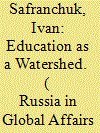

|
|
|
|
|
| Summary/Abstract |
The election of Donald Trump as U.S. president in November 2016 has fueled heated debate in American society. Many people believe that Trumps victory was an accident and a tragic mistake, but just as many insist that the election of the New York billionaire had to happen. In fact, both are right and wrong at the same time. Social trends that had slowly developed in the U.S. made "the Trump phenomenon" possible, but those trends did not necessarily mean that it had to happen in the way that it did. In order to understand this phenomenon and its causes better, let us look at Trump's victory in a broader historical context using statistics starting from 1952, which cover almost three generations. Such an approach should help us correct, or maybe even reconsider, the "feelings" many people think are quite obvious.
|
|
|
|
|
|
|
|
|
|
|
|
|
|
|
|
| 6 |
ID:
157244
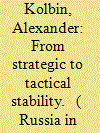

|
|
|
|
|
| Summary/Abstract |
Arms control helped maintain strategic stability during the Cold War. However, after the end of the Cold War, the concept of strategic stability has ceased to be a hostage to the Soviet-U.S. confrontation and the nuclear arms race between the two countries. This concept now includes additional international players and security threats. As a result, Russia and the U.S. have different views on factors that affect strategic stability, and the boundaries of this concept have become blurred. Gone is a common understanding of strategic stability, along with a general understanding of the need for arms control as a factor for this stability. In Russian-U.S. relations stability should be reset at several tactical levels, or at least the parties should implement the idea of "tactical stability" as a new conceptual basis for bilateral arms control.
|
|
|
|
|
|
|
|
|
|
|
|
|
|
|
|
| 7 |
ID:
157239


|
|
|
|
|
| Summary/Abstract |
The spring of 2017 was marked by rather abrupt U.S. interventions in the two most sensitive areas of world politics—Syria and North Korea. The new administration ordered an attack of 59 cruise missiles on Syria in a show of force and has made unequivocal threats against North Korea. In both cases, Russia and China, the top nuclear powers alongside the United States, saw their vital interests affected. Both showed restraint, which inspires hope. But who knows what consequences such actions may have in the future. The world is entering an even more complex and explosive period. It is heavily armed with the most lethal weapons but has lost the moral and intellectual basis for effective deterrence and balance. It is this fact rather than the abundance of weapons as such that causes the greatest alarm.
|
|
|
|
|
|
|
|
|
|
|
|
|
|
|
|
| 8 |
ID:
157250


|
|
|
|
|
| Summary/Abstract |
Are the values of Western liberalism familiar or foreign to us Russians in the second decade of the twenty-first century? To what degree do all of us depend on the current state of affairs, even those who position themselves as cosmopolitans and who are conservatively-minded—ontologically, by virtue of being born in Russia or situationally? Such debates could continue indefinitely with opponents foaming at the mouth, but each time such a ping-pong game will leave a lasting sense of dissatisfaction. This feeling may be stronger or weaker, but it invariably entails a war of words in the media and social networks, regardless of its outcome (The outcome, though, is quite predictable: as a rule, the opponents stick to their original opinions, while neutral onlookers have to state once again that society remains hopelessly split). The reason is simple. From time immemorial in Russia such ideological duels have been driven not by the power of reason, but by the power of the heart and soul, i.e. by feeling and taste, if you wish. This is true not only of conservatives, whose arguments have been traditionally weak and who preferred to rely not on logic, but on their own vision of the world that rests entirely on their subjective likes and dislikes and personal experience. The same equally applies to liberals, whose common sense and ostensibly unshakable objectivism is confined to the stubborn pointing towards the West and the argument that leaves no room for objections: "There it works!"
|
|
|
|
|
|
|
|
|
|
|
|
|
|
|
|
| 9 |
ID:
157238


|
|
|
|
|
| Summary/Abstract |
Three years ago, when everyone commemorated the World War One centenary, Christopher Clark's The Sleepwalkers topped the best-seller list. The book describes how the leaders of great powers, consumed with vanity and ambitions but not actually seeking confrontation, plunged Europe into a senseless massacre. It destroyed the world order and caused instability that lasted over three decades and included a new world war.
|
|
|
|
|
|
|
|
|
|
|
|
|
|
|
|
| 10 |
ID:
157241


|
|
|
|
|
| Summary/Abstract |
Globalization is a years-long transformation of national economies and political relations among countries into an integral geo-economy. Its concept is tightly linked with the idea of world hegemony, which creates a geopolitical supra-structure over the global economic basis it controls. Any transformation of hegemony by virtue of internal reasons or external challenges entails changes in the geo-economic space.
|
|
|
|
|
|
|
|
|
|
|
|
|
|
|
|
| 11 |
ID:
157248


|
|
|
|
|
| Summary/Abstract |
On October 9, 2006, seismic stations around the world registered a seismic event centered near the village of Punggye-ri in the North Hamgyong province of North Korea. That was the first North Korean nuclear test. Since then, the issue of the North Korean nuclear program has entered a markedly different phase.
|
|
|
|
|
|
|
|
|
|
|
|
|
|
|
|
| 12 |
ID:
157245


|
|
|
|
|
| Summary/Abstract |
The Treaty on Measures for the Further Reduction and Limitation of Strategic Offensive Arms (New Start Treaty) was signed by Russia and the United States in 2010 and entered into force in February 2011. Since then, issues pertaining to further steps in nuclear disarmament have disappeared from the agenda of Russian-American relations. For almost four years we have been witnessing a decline (or even absence) of Russian and U.S. efforts in the sphere of nuclear arms control, which can be seen at both the official and expert levels.
|
|
|
|
|
|
|
|
|
|
|
|
|
|
|
|
| 13 |
ID:
157243


|
|
|
|
|
| Summary/Abstract |
The confrontation between Russia and the West and the beginning of a new cycle in the arms race have brought the nuclear weapons issue back to the forefront of world politics after twenty years of oblivion. Donald Trumps administration does not consider progress in nuclear arms control a priority, which may cause Moscow to substantially revise its policy in this field. But in which way? This question remains open.
|
|
|
|
|
|
|
|
|
|
|
|
|
|
|
|
| 14 |
ID:
157249


|
|
|
|
|
| Summary/Abstract |
North Koreas military potential is a major issue on the world's agenda this year for well-known reasons. Standard topics, such as "What are Pyongyang's missile and nuclear capabilities?" have been supplemented with a more general issue: "What weapons does Pyongyang have in actual fact?" Talk has begun again (in the United States it goes the rounds once every few years) of the need to disarm North Korea by force and even overthrow its regime. In order to know how realistic this scenario is and what threats it may pose and to whom if implemented, we need to understand, at least in general terms, what the situation is like for North Koreas adversaries in a military sense.
|
|
|
|
|
|
|
|
|
|
|
|
|
|
|
|
| 15 |
ID:
157252


|
|
|
|
|
| Summary/Abstract |
The Russian World is a multifaceted notion. Coined in the eleventh century, the concept has survived to the twenty-first century and apparently has acquired a firm place in the vocabulary of politics and scholarly analysis. Academician Valery Tishkov said "we are dealing with a phenomenon that has a long history and which has now acquired new conceptual configurations to become a constituent of the culture of new network communities as well as a factor of government policies and international relations." Although politicians, the media, essayists, and researchers widely use the term 'the Russian World,' its content remains undefined. The written form varies as well—sometimes it is put within quotation marks and other times not. There is still no clear rule whether both words or only the first one should be capitalized. In this article (except for quotes) both words are capitalized and no inverted comas are used by analogy with Pax Americana.
|
|
|
|
|
|
|
|
|
|
|
|
|
|
|
|
|
|
|
|
|